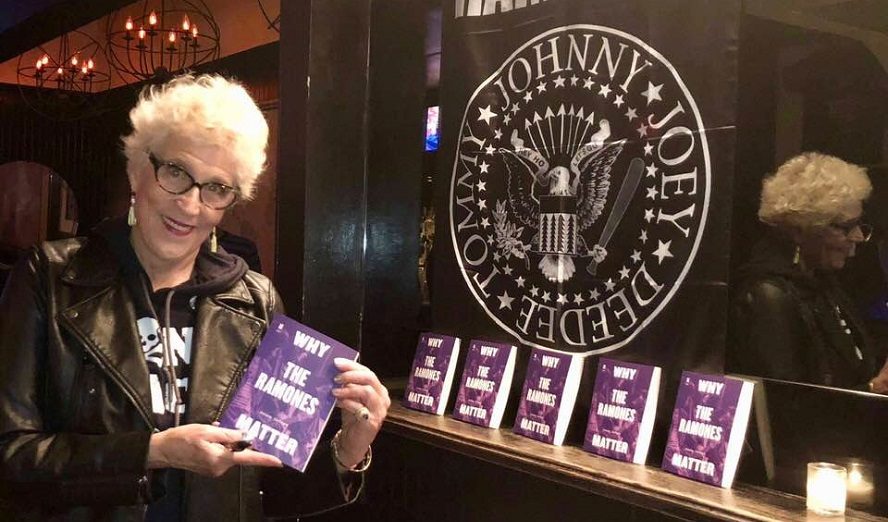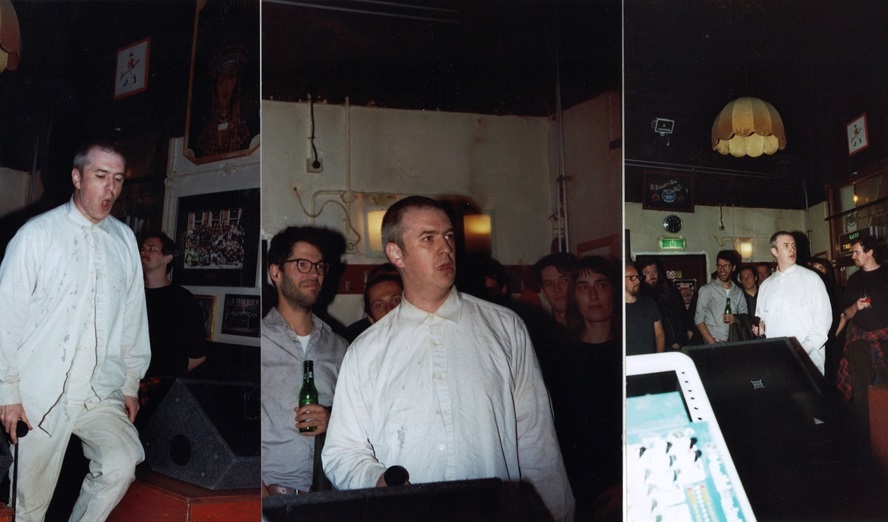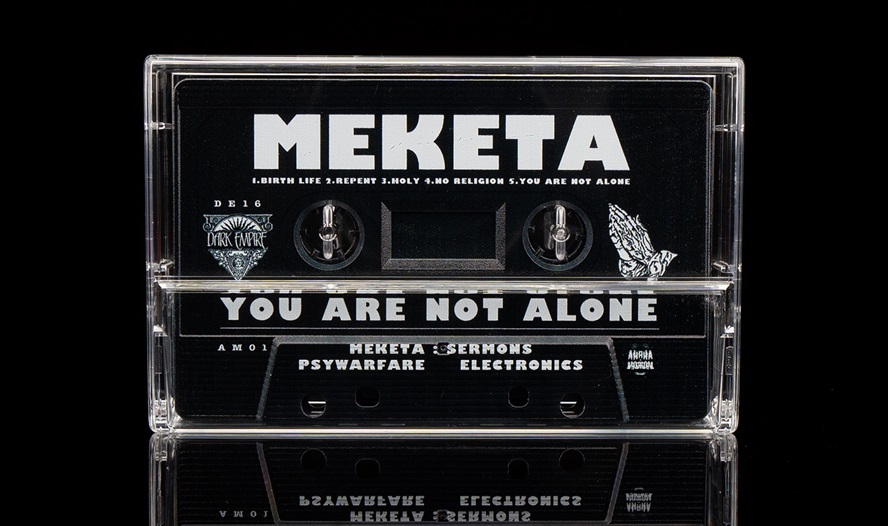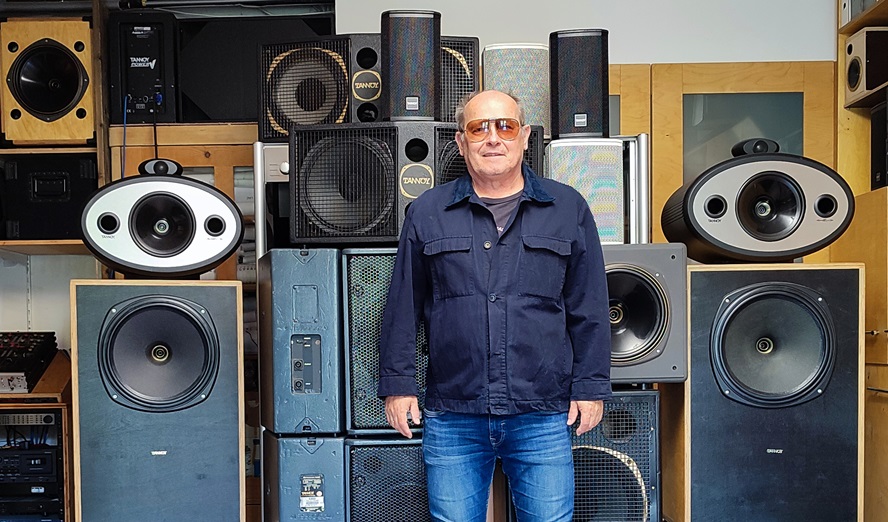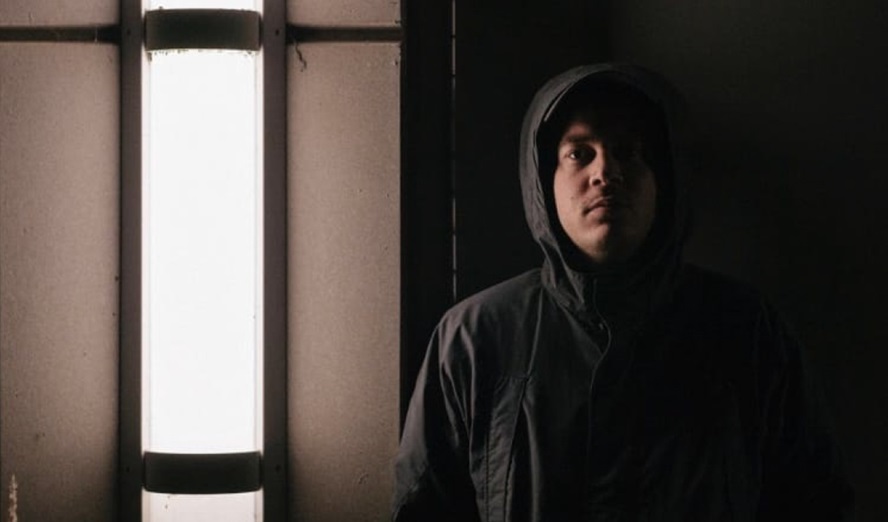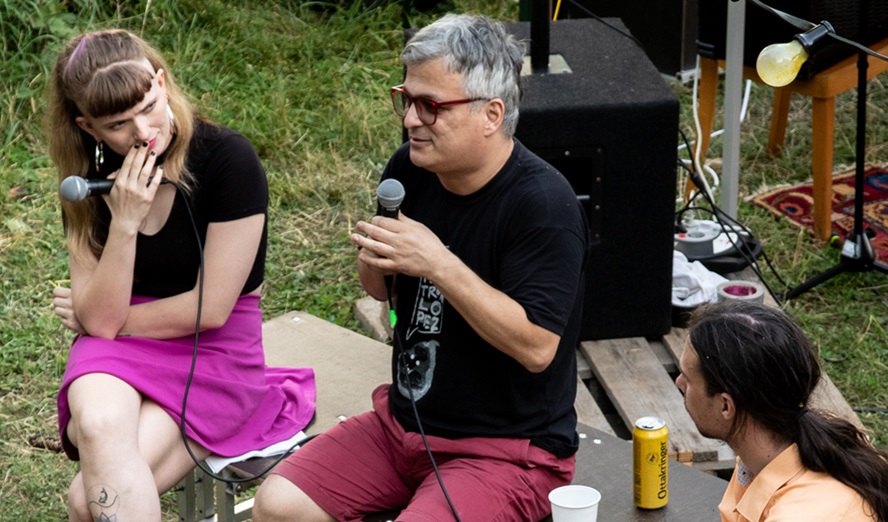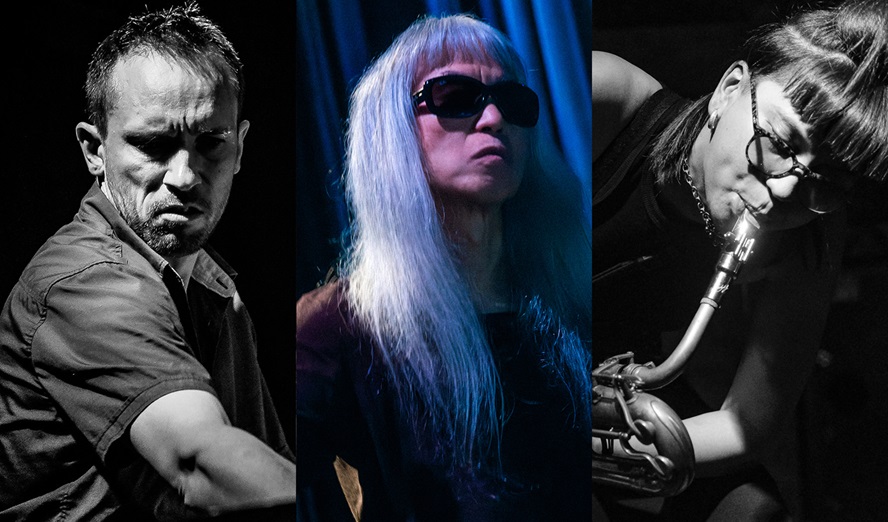The Ramones once saved rock’n’roll and were the blueprint for Britain’s Punkrock in 1976. Three of the original four members died in the first years of the new century. Tommy Ramone died in 2014, but the recognition of the band’s importance continued to rise. Meanwhile, NYC has a »Joey Ramone Place«, of which police officials say it’s the city’s most-stolen street sign. Ironically, Ramones have saved rock’n’roll a second time: Ramones’ »40th Anniversary Deluxe Editions« (2016, 2017, and 2018) got us all hooked again, and in some ways, these recordings outstrip the originals. Joey, the father of punk, would have loved reading »Why The Ramones Matter«. Once he stood on stage with the »Village Voice« in hand, pointing out that Donna Gaines’ article is the best that has ever been written on the Ramones. For Joey, punk was about real feelings, passion, heart and soul; for Donna Gaines too, and she adds the sociological level.
skug: You wrote »Why the Ramones Matter«. Why did you pick the Ramones?
Donna Gaines: I was invited to write about them by the series editor, Evelyn McDonnell. And it was obviously the best choice. I knew them personally and had written about them for years. I interviewed them for the »Village Voice« when they retired in 1996. Once I got involved with, I stayed involved. I wrote their induction essay into the Rock & Roll Hall of Fame. I wrote about their new projects. I listed the shows that Joey produced at Continental in the »Village Voice«. I also wrote their obituaries. I spent time with them, I knew their families. I also grew up in Rockaway Beach, Queens, the surf town made famous by the mighty Ramones.
What was your concept of the book?
The book is part of a »Music Matters« series, published by University of Texas press. The series was inspired by Pete Hamill’s best-selling book about Frank Sinatra. The concept involves a critical examination of why the Ramones matter; musically, culturally, artistically, personally, historically and socially. I had to really think about why they remain so important to me, and to so many people.
When was the first time that you heard the Ramones?
I honestly cannot remember when I first heard them or saw them. I feel like they have always been there, I identified so much with their music, their aesthetics, the Queens logic, the punk ethics. But dates and times and places? I can’t remember any of it. You can probably figure out why. Ha ha ha ha.
When was the first time that you ever saw them live?
I must have seen them whenever they played locally, but that whole part of my life is kind of a blur, clubs, music, lots of booze and cigarettes and leather. I met them in 1996. I got sober a year later, so the early days are a daze.
Tell us about one of your magic live moments with the Ramones?
Meeting Joey for the first time in his apartment was an astonishing experience. He opened the door and everything was purple. He was extremely welcoming and kind. We spent hours talking about music and childhood, love, popular culture, food, family, Carbona and glue. I must’ve been there for 12 hours. The next day we spoke by phone and he said the interview felt like a spiritual experience or maybe psychotherapy, we couldn’t decide. He loved the article. After it was published in the »Village Voice«, he was playing a show at Continental in New York City, and from the stage he held up the newspaper and said it was the best thing that had ever been written about his band. We became very good friends after that. He knew everything about music. He was so much fun, and kind, very tough too, a strong and generous person. He did everything he could to support new bands coming up. He was a great friend.
What was and what is so special about the Ramones?
They helped young people find their own voice and tap into their own creativity through music, and by drawing from the available local resources. They were reclaimed rock’n’roll for the kids and the streets. They seized the airwaves by changing the frequency. The Ramones worked hard and long to carry a message of inclusion. Their first album was groundbreaking. They incited a cultural rebellion. They subverted the means of rock production by showing young people how to DYI – to do it themselves. Their albums are instructional manuals on how to play music. They spearheaded punk as a genre and inspired young people to start bands everywhere. But most of all, they made a point of including the outcasts. They gave us a reason to live and something to belong to. They were genuine, friendly and accessible, down to earth, authentic; they showed us how to believe in miracles.
When you talk to teens, what is your focus, what do you tell them about the Ramones? And what can the Ramones mean to them today?
I think my main focus because of my background as a youth worker and sociologist is a concern with alienation and marginality. Unlike corporate rock or disco, in order to belong to the Ramones’ world you didn’t have to be perfect, you could be human, you didn’t have to be rich or tall or thin or blonde to be worthy of their love and respect. Music and popular culture belong to the kids, not the merchants. That’s a completely radical notion, that we are good enough just as we are. That we are valued and accepted. In my book I include several interviews with fans, all ages, international, three generations, where they all say the same thing – the Ramones gave them hope, meaning, and a place in the world.
Why did the Ramones favor, for the most part, rock’n’roll of the fifties?
Because it was fun and simple and raw and true. By 1970s, it wasn’t.
They wore leather jackets. Okay. But why did they have long hair? Weren’t punks against hippies?
The Ramones were creative, they were trendsetters, not followers. I don’t think they were worried about the tedious punk orthodoxy. When they were starting out, they were doing a whole new thing. They drew from all sorts of influences. They never called themselves punks. This was not politics, it was rock’n’roll.
Punk rock changed over the decades. Were you into Green Day, were you into punk of the nineties? How did you experience that change?
I was thrilled that another generation had discovered them. By that time, I was probably listening to Metallica. But I appreciated bands like Green Day and Soundgarden and Pearl Jam and Rancid because they gave the Ramones the great respect they deserved.
What is the equivalent today?
I have no clue. I listen to Palestrina and Monteverdi.
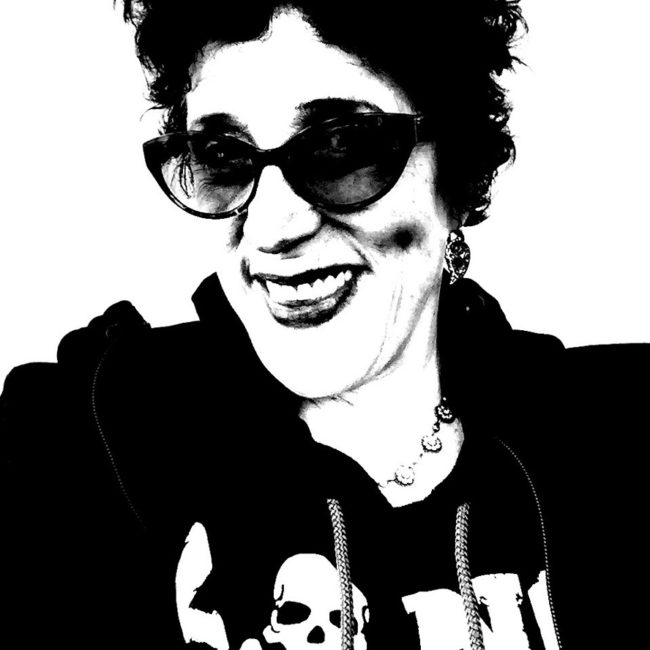
Now let’s dig into your arguments why the Ramones matter: Why were the Ramones culturally so important?
Because they spearheaded a cultural rebellion, creating space for ordinary young people to innovate and create. They convinced the kids that they did not have to be maestros or perfect or rich or even formally trained musically. They encouraged kids to create for themselves. They overturned fashion and style and values. They challenged ideas about the economic base of cultural production by implementing and encouraging kids to do it themselves, DIY. Their subcultural influence was populist and accessible. It was transformative, a cultural rebellion that changed lives.
Why were the Ramones historically so important?
Because they instigated a new genre of music, their approach to their art challenged the dominant culture in very subtle yet subversive ways. They were also the first of their generation to utilize popular culture to address World War II and its impact on Americans, and also Germans. Their cultural referents depicted their moment in history and were gathered from historically specific artifacts and ideas which they reflected in their music.
Why were the Ramones socially so important?
Because they leveled the playing field by including the outsider, gathering together all the misfits, cretins, time bombs and warthogs, drawing them in from the margins. The Ramones welcomed everybody and told them that whatever they were doing, and whoever they were, was good. They gave people the courage to find their own voice, to write their own songs and create their own bands and scenes based on their own truth. After the Ramones, you didn’t have to be rich or beautiful or technically proficient to create, you just had to speak the truth from the heart, and your music, your existence would matter.
Why were the Ramones personally so important?
Because if you were a fan, you knew they were telling you the truth. And when you listened to their music, they would engage you emotionally, connecting you to them, and to millions of people who would understand you, and accept you. Then Ramones were authentic and honest, loving towards their fans. Unlike so many out there, they were not liars. Personally, for me, because I grew up in Rockaway Beach Queens, I felt they were speaking to me. I could identify with them, and their music energized me, their look was easy to incorporate into daily life. Millions of fans feel the same way, even if they never met the Ramones, or saw them. They feel as if the Ramones are their personal friends, their spiritual guides. Some fans pray to them. It doesn’t matter how old you are or when you first heard them, or where you are, they will have an extraordinary impact on you.
The band members fought against each other. That does not sound like a desirable way of problem solving. Or is it?
Well it seems to have worked out as far as their creativity and their music. Bad relationships among band members are pretty common. The Ramones may have been especially toxic. They had strong, creative personalities, some were dealing with mental illness and addiction, and there was violence, bullying too. They worked and toured harder than most bands but did not get the recognition they deserved. They gave it their all, and they knew they were great, magnificent, so they were frustrated.
Politically, they had a republican, or shall we say right wing in the band. Not the coolest of all possible gang members.
The Ramones were not a political band, although their music was profoundly radical and subversive in a very subtle way. The band members represented every ideology … liberal, socialist, conservative and anarchist/apathetic. This diversity enlarged the scope of their music and fan base. They were first and foremost great artists who represented the full spectrum of Americana. I think it worked out just fine. Without that dynamic tension of their personalities and their individual politics, and all the sick stuff that went on, they would’ve never had that brilliant chemistry. It was what it was, and it was perfect.
Let’s move on to Joey: in his later years, was he satisfied with his career and with the bands output? Did he like all of their records?
I think he was very restless creatively, and wanted to move ahead on his solo album so he couldn’t wait to retire. He was also really sick for a long time, and that was very debilitating for him. The road really wore those guys out, but I think it killed Joey, who had health challenges since childhood.
Did he enjoy recording in the studio?
When it came to his solo recording, He loved it! He hand-picked people to work with, people who he really trusted, and he got to do what he wanted. As an artist, he was very particular about what he had in mind and his solo album really shows how talented he was. Even as he was so sick, laying in a hospital bed, he was still telling us that life’s a gas, that he believed in life, and that it was a wonderful world.
What was his opinion about the music business in general?
I think it’s clear from all their biographies and interviews they were all disgusted with it. From all accounts they were frustrated and annoyed. I don’t think Joey was any different than the others in thinking that it could have been so much better.
In the past, we all were fans of some rock or punk band, like the Ramones; and we were fans of some musical genre, like punk or post-punk. Meanwhile there is the internet and YouTube and one can listen to old and new music and lots of styles at the same time. Do you think fandom is still appropriate?
Fandom is a religious form!
Besides the first four Ramones albums, which else do you recommend?
I love them all … there’s at least one killer song on any album. Especially once CJ started writing.
What are your fave Ramones songs?
»Commando«, »I Don’t Care«, »Born to Die in Berlin«, »Havana Affair«, »Outsider.«
Thanks for the interview! It was a pleasure talking to you.
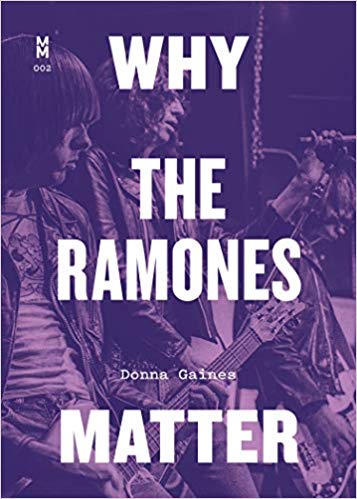
Link: https://utpress.utexas.edu/books/gaines-why-the-ramones-matter
